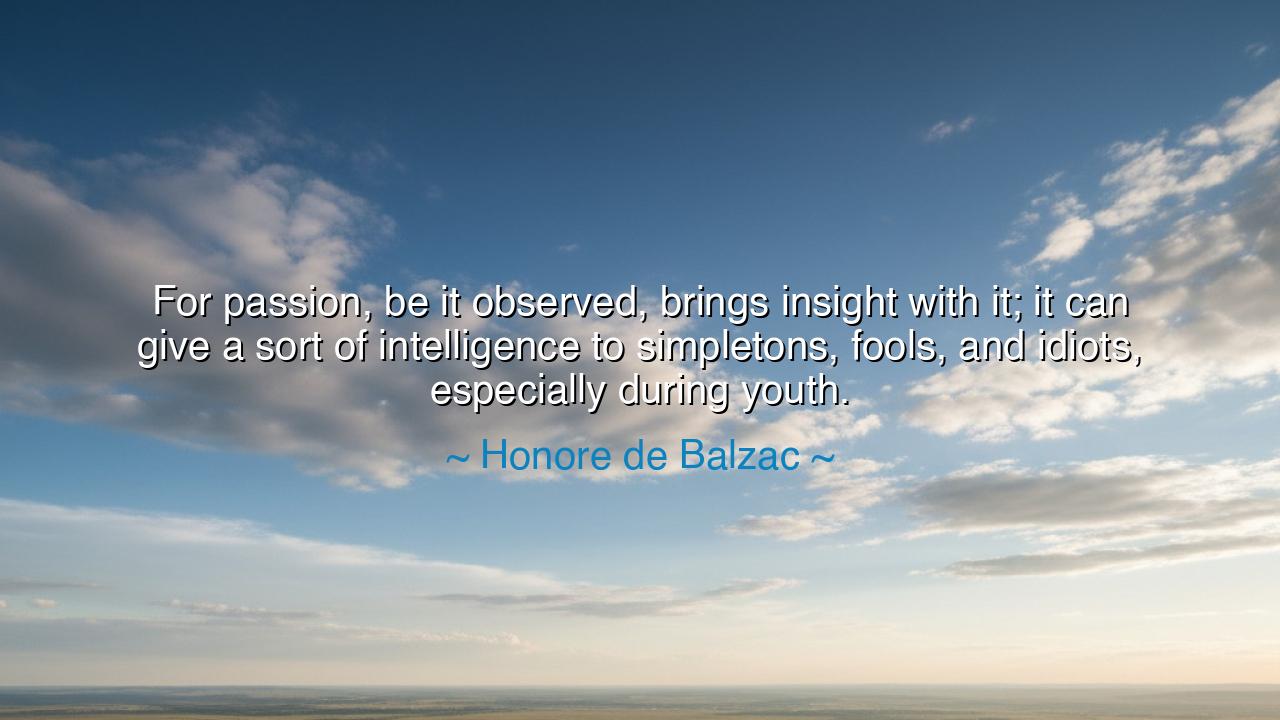
For passion, be it observed, brings insight with it; it can give
For passion, be it observed, brings insight with it; it can give a sort of intelligence to simpletons, fools, and idiots, especially during youth.






In the chronicles of human understanding, Honoré de Balzac, the great observer of the soul, once spoke these immortal words: “For passion, be it observed, brings insight with it; it can give a sort of intelligence to simpletons, fools, and idiots, especially during youth.” These are not words of mockery, but of revelation. Balzac, who gazed upon the secret workings of the human heart with the eye of both poet and scientist, saw what many fail to grasp—that passion is a kind of fire from the divine forge, capable of awakening even the dullest mind to purpose and vision. He reminds us that intelligence alone is cold and inert, but passion, that fierce longing of the soul, can ignite life where none seemed possible.
The ancients knew this truth well. They said that a man without passion is like a ship without wind—beautiful in form, but doomed to drift. Passion is the breath of creation, the pulse that drives heroes to action and artists to beauty. It transforms weakness into strength, hesitation into daring, and ignorance into discovery. For while intellect may calculate, it is passion that compels one to act—and in action, wisdom is born. The mind that burns with love, or art, or justice, sees the world not with the eyes of logic, but with the eyes of revelation.
Consider the tale of Joan of Arc, a humble peasant girl from Domrémy, unlettered and unknown. By the measure of intellect, she was nothing—a simpleton in the eyes of her age. Yet within her blazed a passion so fierce and pure that it lifted her from the fields to the battlefield, from obscurity to immortality. She claimed no learning, only faith; no cunning, only conviction. And yet through that burning spirit, she saw what generals could not see—an inner light that guided her to victory and sacrifice. It was her passion that gave her insight, a kind of divine intelligence that pierced through fear and doubt alike.
So it is with all who live greatly. Passion bestows a kind of second sight—a clarity born not of knowledge but of intensity. The young, especially, feel this truth in their blood. Their dreams are vast, their hearts unbroken by cynicism, and in that fiery season of life, they see with the vision of the gods. A youth driven by passion may know nothing of strategy or philosophy, yet act with a wisdom beyond reason. For when the soul burns brightly enough, it illuminates paths that intellect alone cannot perceive.
But Balzac, wise in the ways of human frailty, also offers a silent warning. Passion gives light, but it can also consume. Fire warms, but it also burns. He reminds us that the insight of passion must eventually be tempered by the discipline of reflection, or it may devour the very life it seeks to ennoble. Youth’s brilliance must ripen into maturity’s steadiness. The same flame that awakens a fool may destroy a wise man if it rages unchecked. Thus, true greatness lies not in extinguishing one’s passion, but in learning to govern it—to make it a servant of purpose rather than a tyrant of impulse.
History is filled with those who struck this balance. Leonardo da Vinci, aflame with curiosity, married his passion for art and science with patient study. His genius was not born from intellect alone, but from an insatiable love of truth—a flame refined by years of labor. Passion gave him vision; discipline gave it form. From their union came works that still whisper to eternity. Here lies the true message of Balzac’s words: passion awakens intelligence, but wisdom perfects it.
Let this be your lesson, then, child of tomorrow: guard your passion, but never smother it. Let it stir you to create, to seek, to love, to serve. When others call you foolish for dreaming, remember that passion gives light even to fools. It is the divine madness from which all art, courage, and progress are born. But as your fire burns, learn to shape it—feed it with truth, guide it with humility, and wield it with care. For the world belongs not to the clever alone, but to those whose hearts burn bright enough to see what intellect cannot.
Thus spoke Balzac, and thus the ages have proven: passion is the first teacher of wisdom. Those who dare to feel deeply, live deeply; and those who live deeply, understand life itself.






AAdministratorAdministrator
Welcome, honored guests. Please leave a comment, we will respond soon